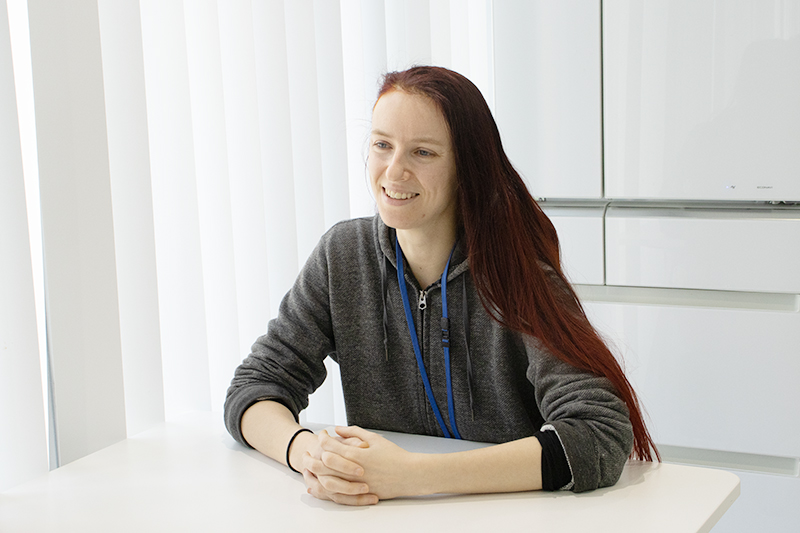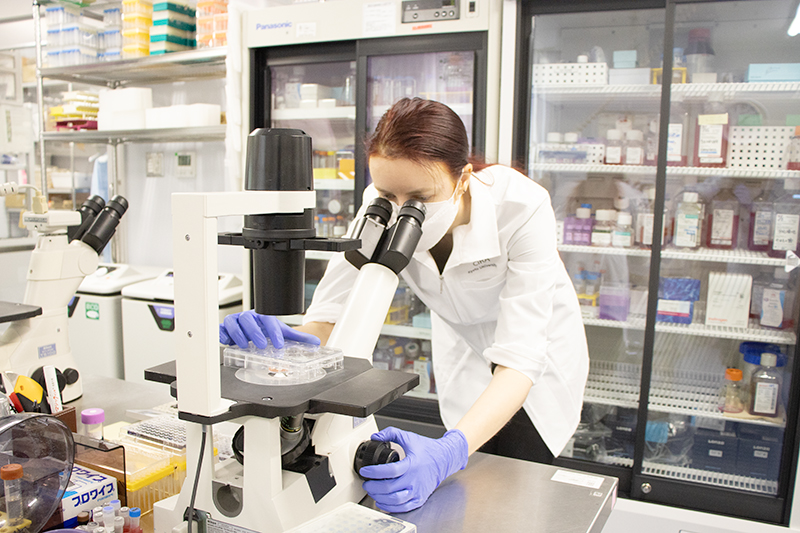
CiRA Reporter
CiRA Reporter

People
April 21, 2023
Learning Regenerative Medicine While Supporting Women Scientists and Raising Awareness for Mental Health

Charlotte Flahou
“My scientific journey, right?” she asked as she sat down for the interview and continued. “I have done vaccine research, developed analytical methods in the industry, worked in neuroscience, and now at CiRA, I am working on regenerative medicine. It is quite broad, but I actually have a very focused research interest. I’d like to work on multiple sclerosis!”
Later this year, Charlotte Flahou, a researcher in the Koji Eto laboratory, will at last put together all that she has learned from those diverse scientific disciplines and start working on her ultimate scientific goal of repairing the damages caused by MS when she goes on the move again to begin her postdoctoral training at Harvard Medical School in Boston, USA.
In Professor Eto’s lab, she works on hypoimmunogenic cell therapies, mainly using blood cells, to understand better how cells escape the immune system so that it will be possible one day to create iPS cell-derived universal cells which could be transfused into anyone. She first worked on a humanized mouse model which can test the immunogenicity of these cells and, in parallel, explored why iPSC-derived platelets do not seem to trigger a unique type of immune defence called “missing-self immunity” after silencing the “self” marker called human leukocyte antigen (HLA).
When talking about her experience living in Japan, Flahou said, “It is very common for foreigners to feel isolated in Japan.” But unfortunately, the COVID-19 pandemic meant even more disruptions to her personal and professional lives on top of the usual struggles faced by anyone moving to a new country without a mastery of the local tongue. She thanks her super supportive mentor, Eto, and the invaluable support network she developed to help her cope with the ups and downs in life during the uncertain times of a Ph.D. pursuit and a global pandemic far from family. With experiments on hold and confined to her tight apartment, writing a review and catching up on new papers, she turned in the bouldering gym for yoga at home. “Being consistent in maintaining hobbies is important,” she said about having a good work-life balance. She added that one must nurture oneself outside of research, emphasizing how one loses creativity and productivity if constantly stressed. She confided in starting opera singing classes a year ago, fulfilling a childhood dream. “Singing loudly also helps to vent and release stress!”

In addition to her rigorous experiments and activities, Flahou sets aside time to volunteer with the international group "500 Women Scientists (500WS)" and a domestic mental health support group called "TELL Japan." She jokingly said she rarely sleeps but clearly looked incredibly alive with her dazzling red hair. She learned about 500WS from a Nature Briefing article shortly after she arrived in Japan and began looking for new connections. Unfortunately (and fortunately), the Kansai region pod (500WS chapter) was not very active then, and the organizers were looking for someone new to take over their work. Arrived for the rescue were Flahou and her new friend Professor Fiona Louis (currently an Assistant Professor at Osaka University), who met monthly to support each other and nursed the pod back to life together. Their efforts have turned the pod comprised of the humble twosome into a group that features about 30 female scientists in the Kansai area from different levels of the academic ladder, ranging from students to professors. The members gather once a month for coffee and cake to provide nurture and support for one another, mentor others in the group on their academic careers, help each other solve interpersonal issues, and cope with the stress and anxiety from everyday life being a woman in science.
“Reach out! You don’t have to struggle alone,” was her advice to anyone facing difficulties in their lives or at work. Most people hesitate to find help when facing issues like a lack of motivation and experiencing depression or anxiety, which lead to feelings of inadequacy, impostor syndrome, etc. Once they open up and reach out to others, they find that they are not alone and become empowered by the realization that others have been in those rough places too before and that there are solutions or ways around every problem. She admitted that the 500WS pod was crucial to her getting through the pandemic and would like to make sure that anyone in need knows that there are people happy to help. Flahou also mentioned that while her 500WS Kansai pod, with a mix of Japanese and non-Japanese members, primarily operates in English. There is also the Kyoto University Gender Equality Promotion Center, where female students and scientists can go for guidance and support in Japanese.
When she finally has time to relax after research, volunteering, and practicing her hobbies, Flahou said she enjoys kinako dango, dumplings covered with sweet soybean powder, from Kotoka in Demachiyanagi, a district about 15 minutes away from CiRA. “No one makes them like they do. And once I start, it is impossible to stop,” she laughed. Already she thinking ahead about what new exciting research she will do in Boston, it will be interesting to see whether she could replace kinako dango with something else in the United States.
(Post-interview note from Flahou: “Actually, who am I kidding? It’s going to be cheesecake. Obviously!”)
-
Interviewed and written by Kelvin Hui Ph.D.
CiRA Research Promoting Office






















